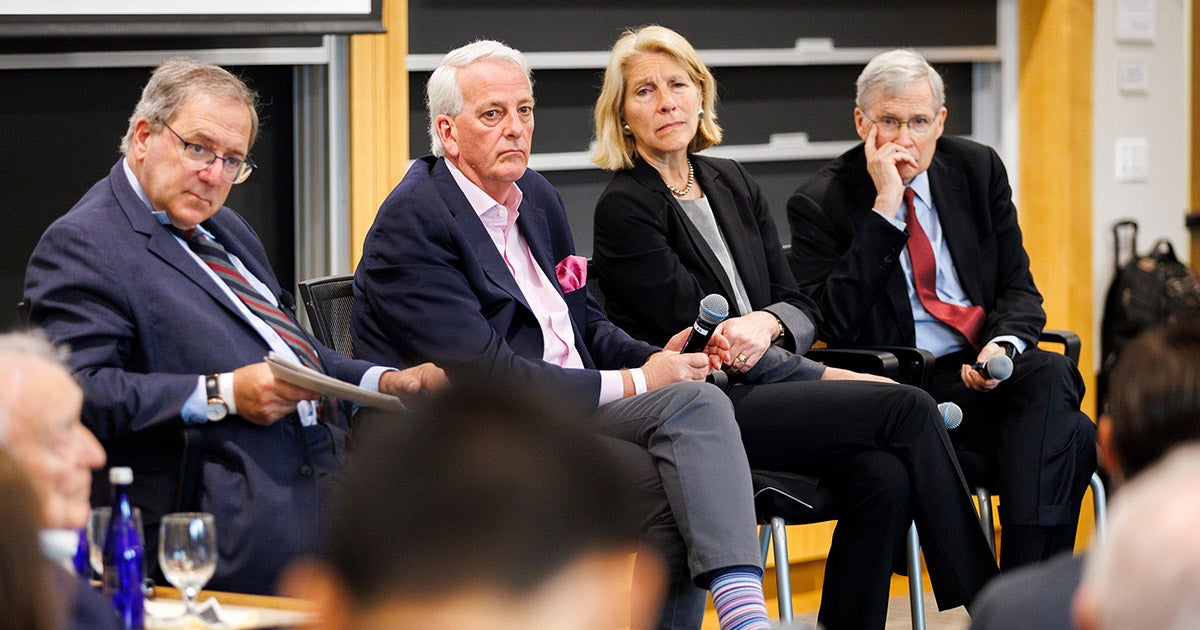As Russia opens a new front in its war on Ukraine and the 75th NATO Summit approaches in early July, national security analysts debated whether the military alliance should widen its role in the conflict during a talk Friday at Harvard Kennedy School.
The war is at “a really critical moment,” said the event’s moderator, David E. Sanger ’82, the White House and national security correspondent for The New York Times. Ukraine suffered damage over the last several months as it waited for Congress to approve a $60.8 billion aid package in late April. The Russians have regained territory in Eastern Ukraine, he continued, and while they’ve endured significant casualties, their fighting force remains large and strong and has gotten better at using drones and other forms of electronic warfare.
“This is not a war about territory, it’s a war about the future of Ukraine,” said Ivo Daalder, former U.S. Ambassador to NATO and now president of the Chicago Council on Global Affairs. “The way to defeat Russia is for Russia to be denied the opportunity to determine Ukraine’s future.”
Even as the U.S. announces a $400 million military aid package to deliver weapons, artillery, and other munitions to Ukraine, Daalder said he is “deeply worried about where we are.” He fears the stalemate on the battlefield that began in November 2022 could give way to an advantage for Russia because U.S. weapons and aid are arriving “too late,” and Ukraine’s military mobilization has been “woefully inadequate.” The average age of Ukraine’s fighting force is 43 years old, a “stunning” figure, he said, and Ukraine is being outpaced by Russia in its efforts to conscript fresh, younger fighters to relieve troops that have been fighting for more than two years.
“This is not a war about territory, it’s a war about the future of Ukraine.”
Ivo Daalder
Many European Union countries continue to provide support to Ukraine, and some, like Lithuania, are considering sending their own troops to fight. Whether other NATO allies and the U.S. ought to do the same, given the stakes, will be a topic of serious debate at the upcoming summit in Washington, D.C. French President Emmanuel Macrón, the leadership of the Baltic states, and possibly Polish President Andrzej Duda are expected to address the wisdom of direct military support.
Still, the U.S. remains a “hugely important actor” in the direction this conflict will take in the coming months, according to Karen Donfried, former assistant secretary of state for European and Eurasian Affairs in the Biden administration and a Belfer Center fellow. The EU can’t replace the role that the U.S. is playing in Ukraine, she said. “Were it not for the weapons we’re providing Ukraine, they would not still be in this fight.”
The question NATO allies need to be asking themselves right now, said Daalder, is how important is Ukraine “not failing” to future European security? “And so far, we have said, it’s not important enough” to do everything we possibly can, like committing troops and more air defense.
Though still supportive of the war, the Ukrainian people have been worn down by it.
Stephen Hadley
Ukraine needs to do several things to turn the tide, said Stephen Hadley, a former assistant to President George W. Bush on national security affairs and deputy national security adviser under Condoleezza Rice. First, Ukraine must increase its capacity to defend territory and “dig in” to defend areas it still controls; improve its air defense to better protect the country’s energy infrastructure and people; build up a defense industry so it’s not as reliant on the West; continue to go after Russian logistics; and challenge Russian control of Crimea, like Ukraine did with control of the Black Sea, in a bid to prompt Russian President Vladimir Putin to come to the negotiating table.
Though still supportive of the war, the Ukrainian people have been worn down by it, said Hadley. President Volodymyr Zelensky faces “some very difficult decisions” about if, or how, to wind down the war if there’s an opportunity to strike a deal while Russia still controls large areas of Ukraine. NATO allies can offer help with that quandary, Hadley said.
Meanwhile, a newly re-elected Putin feels very confident right now and Russia will do “everything in its power” to ensure that it has the upper hand by the time the NATO summit begins, said Donfried. “He thinks he’s winning.”
None of the panelists expect Ukraine and Russia to enter into a negotiated settlement in the next 12 to 18 months.
“Most wars don’t actually end in negotiation. Most wars end in victory, exhaustion, or stalemate,” said Daalder. “And so, we’re much better off not focusing on how do we get them to the table … and talk about, how do you stabilize the situation for long enough to alter what is, in fact, happening and needs to happen to alter the political situation between Russia and Ukraine?”
The talk was part of the Belfer Center for Science and International Affairs’ 50th anniversary celebration. Launched in 1973, the Belfer began as a research center on nuclear arms control and policy and grew to become a highly influential national security think tank.
Source link

